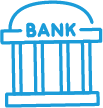Direct impact
Business






GRIs:
Direct impact which can be effectively managed by the PZU Group companies is in the area of real estate administration and management. Direct impact on the environment is above all related to the maintenance of facilities and employment of personnel. It concerns consumption of electrical and heat energy, water consumption, generation of waste, etc. It is also the requirement for paper and other office supplies, as well as fuel consumption by the car fleet.
Operations are related to the generation of waste, a large part of which can be recycled (paper and other recyclable materials), sewage, and dangerous waste in small quantities (toners, used up fluorescent lamps) managed in compliance with legal regulations. Thermomodernization works are conducted in individual buildings (incl. renovations of central heating installations, façade heating, window replacement) and heater thermoregulators are replaced. For a few years there has been a selective collection of waste in branch buildings and buildings occupied by the PZU Group Headquarters.
In 2017, actions continued to optimize processes in order to reduce the generation of documents and their archiving. That included the reduction of the total number of printers in individual offices to be superseded with multifunction network devices and the reduction of paper documents in favour of documentation kept in electronic systems.
An important aspect of direct impact is also fleet management. A policy in this regard defines the aspects of key importance for the cycle of depreciation and purchase of new cars. In accordance with the adopted assumptions, ole cars are replaced with cars with lower capacity and low fuel consumption. Additionally alternative solutions for fleet modernization are analyzed, e.g. purchase of hybrid propulsion cards.
Awareness of the direct impact on the environment is also visible in the approach adopted by subsidiaries. They are focused on activities that generate environmental savings by reducing their demand for utilities (e.g. electricity and water), optimizing the consumption of paper and reducing the volume of business travel. Two foreign companies, Lietuvos Draudimas and AAS BALTA, have formalized environmental policies in place.
Moreover, a portion of Lietuvos Draudimas’ energy consumption comes in the form of green energy generated from renewable sources. In PZU Lithuania Life, centralized printing devices were deployed in 2017. This solution has both brought savings in electricity consumption and enabled the company to reduce the number of unnecessary printouts.
Of key importance from the managerial viewpoint at PZU Zdrowie in the environmental dimension are the following elements:
- waste management, in particular pertaining to hazardous medical waste, in accordance with the applicable legal requirements,
- application, in medical procedures, of only those supplies that have been admitted to marketing and have been certified,
- strict compliance with the rules of safe sterilization, washing and disinfection,
- stringent approach to the rules of patient and personnel safety in radiological medicine (compliance with the requirements of atomic law),
- environmentally safe withdrawal from use of drugs past their expiry date and storage of vaccines,
- deployment of modern technologies and environmentally friendly solutions in medical services (including online consultations, electronic medical documentation, teleradiology),
- replacing paper printouts with documents existing in electronic form (where possible).
These issues are governed not only by the applicable provisions of law but also by the pertinent internal procedures and instructions.
The direct impact exerted by TFI PZU and PTE PZU on the natural environment is minor and may be considered immaterial. Their office- based activities are carried out in facilities owned by the PZU Group and managed by other companies that endeavor to optimize the consumption of energy and utilities in the buildings under their management. For this reason, neither TFI PZU nor PTE PZU have any formal environmental policies in place.
By virtue of the character of their business, the banking sector companies exert no direct significant adverse impact on the natural environment. At the end of 2017, the PZU Group’s banking sector companies had no formal environmental protection policies in place. However, despite the absence of such formal regulations, these companies strive to reduce their impact on nature to a minimum.
In Bank Pekao, the issue of environmental protection is taken into account in several sets of internal regulations. Through them, the bank attempts to minimize its environmental impact by installing environmentally friendly technological solutions in its own facilities, by renewing its vehicle fleet with low- emission cars and by monitoring its use of raw materials and consumables.
Moreover, for a number of years the bank has been consistently involved in efforts aimed at protecting the Polish bison – a unique and exceptional species threatened with extinction. Within the framework of these activities, in 2017 the bank continued its cooperation with six leading institutions engaged in conservation endeavors intended to save this largest European mammal. The aid provided by the bank is apportioned to the diversification and development of the bison population, maintenance of the Bison Breeding Center of the Białowieża National Park, care for the herds and co- funding of scientific and educational projects.

Thanks to the application of innovative solutions, members of the Alior Bank Group are able to take effective steps aimed at reducing the volume of printed documentation. Moreover, the practice of waste segregation is in place in the bank’s headquarters in Warsaw, Kraków and Gdańsk. The company also intends to modernize, in the near future, its electrical installation and replace its lighting system with much more energy-efficient LED-based solutions.
